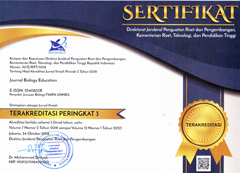KEEFEKTIFAN GUIDED INQUIRY DISERTAI FLOW CARD MATERI SISTEM PERNAPASAN MANUSIA DI SMP
Abstract
Penelitian ini bertujuan untuk menguji keefektifan penerapan Guided Inquiry disertai Flow Card pada materi sistem pernapasan manusia di SMP Negeri 38 Semarang. Penelitian ini menggunakan desain pre-eksperimentaldengan pola one shot case study. Populasi penelitian ini adalah seluruh siswa kelas VIII SMP N 38 Semarang tahun ajaran 2014/2015. Sampel penelitian adalah siswa kelas VIII A dan VIII B. Pengambilan sampel menggunakan teknik Purposive sampling. Data penelitian berupa aktivitas siswa, hasil belajar siswa, tanggapan siswa dan tanggapan guru. Hasil penelitian menunjukkan bahwa keaktifan siswa termasuk kategori aktif yaitu sebesar 82,3%. Secara klasikal ketuntasan belajar siswa termasuk dalam kriteria sangat baik yakni sebesar 91,9 % serta tanggapan siswa dan guru selama proses pembelajaran termasuk kriteria sangat baik. Kesimpulan penelitian ini adalah pembelajaran dengan menggunakan Guided Inquiry disertai Flow Cardpada materi sistem pernapasan manusia di SMP N 38 Semarang dapat diterapkan karena terbukti efektif.
Â
This research aimed to examine the effectiveness of the application of the Guided Inquiry with Flow Card in the human respiratory system materials in SMP N 38 Semarang. This research was pre-eksperimental design that uses one shot case study. The population was all students of class VIII of SMP N 38 Semarang school year 2014/2015. The sample is students of class VIII A and VIII B. The sampling technique by Purposive. The data of research were student activity, students learning outcomes, student and teacher responses. The results showed the student activities included in active criteria that are 82,3%. Students classical completeness included in very good criteria that are 91,9 % and Students and teacher responses during the learning process were excellent. Conclusion of the study that learning by using the Guided Inquiry with Flow Card model of learning material in the human respiratory system SMP N 38 Semarang can be applied because it proved effective
References
Arikunto, S. 2006. Prosedur Penelitian Suatu Pendekatan Praktik Edisi Revisi VI. Jakarta: Rineka Cipta.
Bello, T.O. 2011. Effect of Group Instructional Strategy on Student’s Performance in Selected Physics Concepts. Online J African Educ Res Net, 11(1): 71-79.
Bilgin, I. 2009. The Effects of Guided Inquiry Instruction Incorporating a Cooperative Learning Approach on University Students Achievement of Acid and Bases Concepts and Attitude. Scientific Research and Essay, 4 (10) :1038-1046.
Kidwell, C.F. 2010. The Impact of Student Engagement on Learning: the Critical 10th EPC for California. J Assoc California Sch Adm. March-April: 1-5.
Opara, J.A. 2011. Inquiry Method and Student Academic Achievement in Biology: Lesson and Policy Implications. American-Eurasian J Sci Res, 6(1): 28-31.
Opara, J.A. & N.S. Oguzor. 2011. Inquiry Instructional Model and the School Science Curriculum. Cur Res J Soc Sci, 3(3): 188-198.
Riandari, H. 2012. Peningkatan Keaktifan dan Pemahaman Siswa melalui Guided Inquiry. Universitas Negeri Surakarta. Solo.
Rifa’i, A. & A. Chatarina. 2010. Psikologi Pendidikan. Semarang: UNNES.
Tsang, A.K. 2011. In-class Reflective Group Discussion as a Strategy for the Development of Students as Evolving Professionals. Inter J Scholar Teach & Learn 5(1): 1-20.
Ugwuadu, O. 2012. The Effect of Guided Inquiry and Lecture Methods on Student’s Academic Achievement in Biology: A Case Study of Yola North Local Goverment Area of Adamawa State. Knowledge Review, 1(1).
The copyright of the article once it is accepted for publication shall be assigned to the journal as the publisher. The intended copyright includes the right to publish the article in various forms (including reprints). The journal maintains the publishing rights to the published articles.
This work is licensed under a Creative Commons Attribution 4.0 International License.







